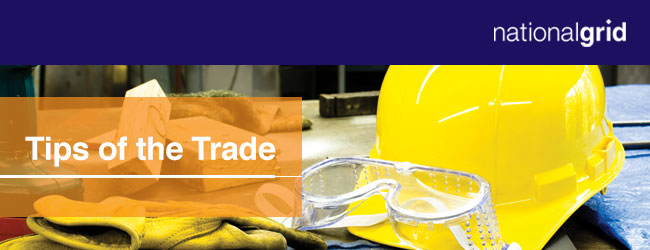
Overhead and underground safety practices
Welcome to National Grid’s Tips of the Trade. National Grid is committed to your safety and these tips are intended to help you work safely near our facilities. Please review these tips with your coworkers at your tailgate or toolbox meetings before work begins.
Look up and live
Dig safelyCall 811 or make an online request well in advance of any digging job, no matter how small. The 811 service will notify underground facility owners in the immediate area so the location of utility lines can be marked prior to excavation. Before you call, delineate your dig area with white paint, flags or stakes.
Would you like to know more?Additional overhead and digging guidelines, case studies, instructional videos and training tools can all be found, at no charge to you, on National Grid’s e-SMARTworkers website. Do you like this email series? Do you find the information helpful? We’d like to know. Please reply to this email and tell us what you think, or let us know what topics you’d like to see in future emails. For more contractor safety information, visit ngridsafety.com. |
|||||||||
 |
Smell Gas. Act Fast. |
||||||||
Call 811 or enter an online request at least 72 hours before digging in Massachusetts and Rhode Island, and at least 48 hours in New York, excluding weekends and legal holidays:
| |||||||||
|
|||||||||
| #10766 |